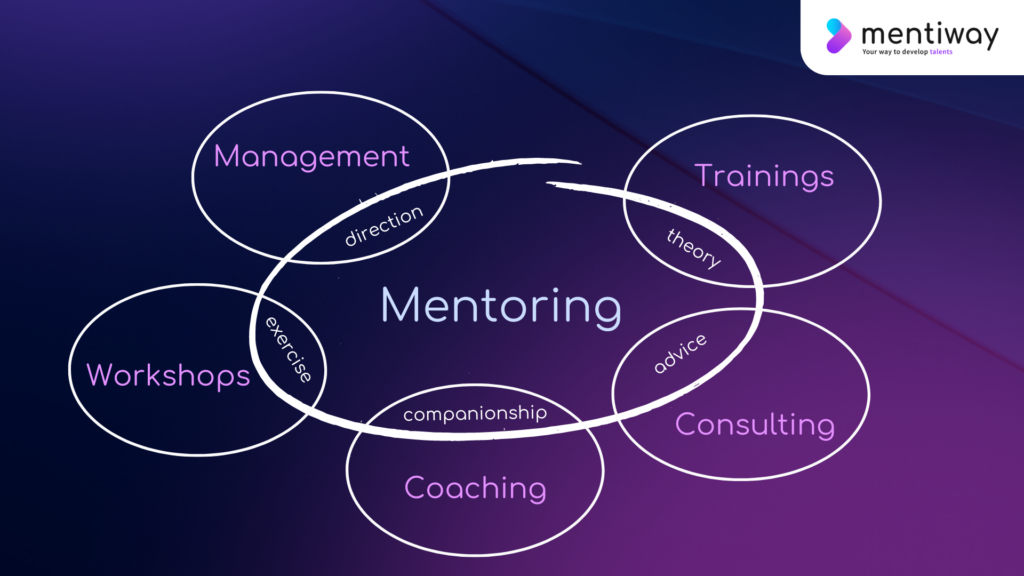Coach vs Mentor – roles, competencies – similarities and differences
Mentoring is often compared to coaching. Not surprisingly, both forms of development have many elements in common. And in a similar way – the role of the Mentor is compared to that of the Coach. In many ways, the roles, competencies and behaviors of both are similar. But there are also a few differences worth noting. In this article we will address these similarities and differences.
Mentoring vs. coaching
First of all, before we move on to analyze the competencies and roles of the Coach and Mentor, it is worth looking at and understanding what mentoring is and what coaching is.
I have already made this comparison in a previous article: Mentoring vs. coaching and other forms of talent development. For a deeper understanding of what mentoring is, I also invite you to read an extensive article on the definition of mentoring.
Here I only briefly post an excerpt from previous texts:

Mentoring is a process in which an experienced employee, called a Mentor, provides support to a less experienced employee, a Mentee. It is a more long-term engagement that aims to transfer knowledge, experience and skills. Mentoring builds trust and relationships between employees.
Coaching, on the other hand, focuses on an individual’s personal and professional development. The coach helps the employee understand his or her goals and challenges and supports him or her in achieving them through questions and prompts.
In these simple definitions you can already see the basic difference between mentoring and coaching. Namely, in mentoring, the Mentor’s knowledge and experience in the chosen field plays an important role. That is, if mentoring is about IT-related topics, for example, the Mentor must be an expert in this field. In coaching, such expert knowledge is not required.
Common roles for Mentor and Coach
Just as in terms of the forms of development themselves – mentoring and coaching have many things in common, the roles of Mentor and Coach are similar in many aspects.
I also wrote about the roles and responsibilities of a Mentor in a previous article: Role and Responsibilities of a Mentor. Most of the roles listed there are appropriate for Coaches as well. These Mentor roles are:
- Companionship, or being in partnership with the Coachee/Mentee.
Both Coach and Mentor should accompany the other person in their development, but not to advise or find solutions for them. This accompaniment is about building trust and safety so that it is the Mentee/Coachee who has the space to learn about themselves, grow, make mistakes and build their own experience. - Supportive – Both Coach and Mentor show interest in the other person and the topics brought to the coaching/mentoring sessions. Supports the client in broadening perspectives, finding new solutions, changing context. Adds courage and encourages full involvement in the process.
- Active Listening
The Coach and Mentor should be fully attentive to what the Client is saying. They should try to understand their point of view, deepen answers, use paraphrasing, reflect feelings, summarize what was said. All this is done to better understand the needs of the client, but also to give space to speak, which must be preceded by reflection on the topic, self-reflection, getting to know oneself. - Pose coaching questions – this is a very characteristic role of Coaches, but also of Mentors/Mentees. It’s about asking questions that make you think and analyze even harder, that help you reflect, but also allow you to channel your aspirations towards specific solutions. During both coaching and mentoring sessions, the client will often hear: “why?”, “how do you evaluate it?”, “why is it necessary?”, “if …. , then what?”, “what will allow you to achieve your goal?”, etc. Here you will find a few examples of questions here in a broader article on coaching questions.
- Analyzing and drawing conclusions and sharing those conclusions with the Client.
In the work process, the Mentor and Coach have access to a lot of data, both those collected from the Client and those that are their own resources. An important role of both of these characters is the ability to connect “many dots” and draw conclusions that are useful to the Client.
Coach vs. Mentor – the difference in knowledge sharing
This is what the common roles of Mentor and Coach look like. As you can see, there are a lot of them, and there are basically only two differences. One arising directly from the assumptions of mentoring and coaching, and the other arising, as it were, from practice, being the result of both types of processes.
That first difference is the aforementioned domain knowledge and sharing that knowledge.
The special feature of a Mentor is that they have knowledge and experience in their chosen field. In that area that is related to the purpose of mentoring. If the Mentee wants to develop his sales skills through mentoring, for example, then the Mentor must be a good salesman, with knowledge and experience. If the Mentee is looking for support in returning to work after a long break, then the Mentor should have a history of such leave/time away and a successful return to work.
A coach, on the other hand, professionalizes mainly in the area of development, psychology and the conduct of coaching processes themselves. He does not necessarily have knowledge in a particular field. He does not share his own knowledge, but rather further activates the Client-Coachee to self-analyze and find solutions on his own.
Coach vs. Mentor – difference in coaching experience
The second difference is due as I mentioned to the practice itself – it is the result of the characteristics of the work of Coaches and Mentors.
A mentor is usually primarily a specialist in their field. A mentor can be, for example, a good programmer – at the senior level, an experienced salesperson, a person who has already gone through some of the challenges that are the subject of mentoring. Mentors often do mentoring as a side activity, pursued out of passion, a desire to grow, sometimes outside the hours of their primary job.
Mentors don’t even need to have mentoring experience to successfully lead the process. A certain predisposition and proper implementation will suffice.
On the other hand, Coach usually specializes in coaching, often also in consulting, human resources development, psychology. So he or she has more experience and knowledge in the field of coaching, usually confirmed by training and accreditations. For a Coach realizing coaching is very often the main occupation.
Of course, there are also Mentors for whom mentoring is their core business. But even then, they often rely on their previous experience gained while building a career in corporations or business. Then mentoring is for them another stage of development, but still supported by knowledge and experience in the mentored field.
Core Competencies for Coaches and Mentors
We already know the basic roles of Coaches and Mentors – those in common and those that differentiate them. The question now is what competencies are needed to become a Coach or Mentor.
In both cases, these competencies are very similar, but because of the aforementioned difference in the “process” of becoming a Coach and Mentor, these competencies are defined a little differently, from a different perspective.
Mentor  Competencies;
In the case of Mentors, we have already described competencies in a previous article. We define them on two levels. The first is related to the sharing of work between previous responsibilities and the new role of Mentor itself. These include:
- Willingness to help others – as a predisposition to expand the role of a specialist in one’s field to that of supporting others in their development.
- Disposability – as in, in general, the ability to carve out some time from one’s current job for a new role.
- Motivation – related to the willingness to participate in and learn the mentoring process.
- Knowledge and experience in the field – this is the basic requirement of a Mentor – in order to share your knowledge, it is first necessary to have it.
The second category of required competencies is already more related to leadership and skills related to developing others. They also largely overlap with the competencies associated with coaching:
- The ability to set goals for yourself and others,
- Providing constructive feedback,
- communication skills,
- active listening,
- asking questions.
Key Competencies of Coaches
In the case of Coaches, competency models usually do not touch the area of expanding current responsibilities – as in the case of Mentors. These models usually already deal with the coaching process itself and are related to communication, leadership and directing the development of others. One such model is 8 competencies of Coaches according to the ICF (International Coaching Federation). These competencies are:
- Acting in accordance with ethical principles.
- Incorporating a coaching attitude in life – developing curiosity in oneself, openness to the Coachee, full focus on the process.
- Lead the establishment of the contract and rules of cooperation – the Coach in a greater role than the Mentor manages the process, also in terms of general guidelines and rules of cooperation.
- Build a sense of trust and security.
- Maintaining Presence – Full Attention to the Customer.
- Active listening.
- Stimulating Coachee Awareness.
- Facilitating client development through partnership, supporting autonomy.
As you can see, many of the competencies of Mentors and Coaches coincide, and the key difference is that Mentor to fulfill his role must divide his time between working in his domain and mentoring. A Mentor is first and foremost a specialist in his or her field, and only a Mentor by the way. A Coach is first and foremost a Coachee, so competencies are defined in a more precise way with an expanded.
Hi, my name is Thomas. I am the Co-Founder of Mentiway. We are happy to share our knowledge and support organisations on their way to success! 💪 If you are interested in how to efficiently and effectively implement a mentoring programme in your organisation using technology:








